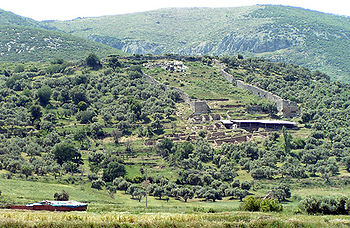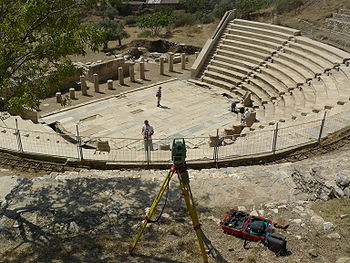.gif)
Metropolis (Anatolia)
Encyclopedia

Turkey
Turkey , known officially as the Republic of Turkey , is a Eurasian country located in Western Asia and in East Thrace in Southeastern Europe...
near Torbali
Torbali
Torbalı is a district of İzmir Province of Turkey.An ancient Ionian city, famous for its wines and religious sites, it has three sancuaries in marble dedicated to the Roman Emperor Augustus and his foster child Germanicus, in an ancient theatre which dominates the valley. Pieces of art found during...
- approximately 40 km SE of Izmir
Izmir
Izmir is a large metropolis in the western extremity of Anatolia. The metropolitan area in the entire Izmir Province had a population of 3.35 million as of 2010, making the city third most populous in Turkey...
. The city was first investigated through archaeological
Archaeology
Archaeology, or archeology , is the study of human society, primarily through the recovery and analysis of the material culture and environmental data that they have left behind, which includes artifacts, architecture, biofacts and cultural landscapes...
field work from 1972 by Professor Recep Meriç from the Dokuz Eylül University
Dokuz Eylül University
Dokuz Eylül University is one of the preeminent universities in Turkey. It is located in İzmir, Turkey. It was founded in 1982 and is organized in 10 schools...
, Izmir. Metropolis has been excavated since 1989.
Classical
Classical antiquity
Classical antiquity is a broad term for a long period of cultural history centered on the Mediterranean Sea, comprising the interlocking civilizations of ancient Greece and ancient Rome, collectively known as the Greco-Roman world...
, Hellenistic, Roman
Ancient Rome
Ancient Rome was a thriving civilization that grew on the Italian Peninsula as early as the 8th century BC. Located along the Mediterranean Sea and centered on the city of Rome, it expanded to one of the largest empires in the ancient world....
, Byzantine
Byzantine
Byzantine usually refers to the Roman Empire during the Middle Ages.Byzantine may also refer to:* A citizen of the Byzantine Empire, or native Greek during the Middle Ages...
and Ottoman
Ottoman Empire
The Ottoman EmpireIt was usually referred to as the "Ottoman Empire", the "Turkish Empire", the "Ottoman Caliphate" or more commonly "Turkey" by its contemporaries...
periods are represented. The earliest known settlement at the site is from the Neolithic
Neolithic
The Neolithic Age, Era, or Period, or New Stone Age, was a period in the development of human technology, beginning about 9500 BC in some parts of the Middle East, and later in other parts of the world. It is traditionally considered as the last part of the Stone Age...
showing evidence of contact and influence with the Troy I littoral culture. An as yet undeciphered seal written in hieroglyphics similar to those of the Hittites
Hittites
The Hittites were a Bronze Age people of Anatolia.They established a kingdom centered at Hattusa in north-central Anatolia c. the 18th century BC. The Hittite empire reached its height c...
has been found in the acropolis of Metropolis. The Hittite kingdom of Arzawa
Arzawa
Arzawa in the second half of the second millennium BC was the name of a region and a political entity in Western Anatolia, the core area of which was centered on the Hermos and Maeander river valleys, corresponding with the Late Bronze Age kingdoms of the...
had its capital Apasas (later Ephesus
Ephesus
Ephesus was an ancient Greek city, and later a major Roman city, on the west coast of Asia Minor, near present-day Selçuk, Izmir Province, Turkey. It was one of the twelve cities of the Ionian League during the Classical Greek era...
) some 30 km to the south west. Metropolis was a part of the Hellenistic kingdom of Pergamum and during this period the city reached a zenith of cultural and economic life. A temple dedicated to the war god Ares
Ares
Ares is the Greek god of war. He is one of the Twelve Olympians, and the son of Zeus and Hera. In Greek literature, he often represents the physical or violent aspect of war, in contrast to the armored Athena, whose functions as a goddess of intelligence include military strategy and...
, one of only two known such temples, has been located here.

External links
- The Official Site of Metropolis Excavations
- Kulturhistorisk Museum Universitetet i Oslo Metropolis Page
- Facebook Group of Metropolis Excavations



